Conspicuous consumption
boredom
is a
life-style disease
a side effect of
wealth
 The
Strand, on Fourth Avenue, New York, claims on their website that they
have 18 miles of books. They also sell books by the foot. Prices ranging
from $ 10 per foot for hard cover bargain books up to $ 400 per foot for
antique leather books. They will custom design a library or a bookshelf
to match any home or office. The
Strand, on Fourth Avenue, New York, claims on their website that they
have 18 miles of books. They also sell books by the foot. Prices ranging
from $ 10 per foot for hard cover bargain books up to $ 400 per foot for
antique leather books. They will custom design a library or a bookshelf
to match any home or office.
This I thought was a typical example of ‘Conspicuous Consumption’,
and it is not for the like of us, who prefer to sift through the books
on the racks placed on the pavement outside the Strand, at prices
ranging from $ 0.50 to $ 1, sometimes to find great bargains.
The Strand also attracts rare book hunters, who search for rare
books, which they could pick up for half the listed price or even less,
which they immediately offer to antique book collectors at highly
inflated prices.
Books or paintings or any item that claims a very high price just
because it is a rarity or because it is unique, may not have any
artistic value.
A rare first edition copy of a book has the same contents, and can be
read and enjoyed the same way that we can by reading the latest edition.
The first edition could be important if there are major changes in
the later editions and someone wants to compare the two editions.
 The
‘Coffee Table Book’ is one more example for ‘Conspicuous Consumption’.
They are large hard cover books meant to be glanced through, ‘to inspire
conversation or alleviate boredom’. Only a few people in our country
could afford to buy such books, or have a place to keep them at home. The
‘Coffee Table Book’ is one more example for ‘Conspicuous Consumption’.
They are large hard cover books meant to be glanced through, ‘to inspire
conversation or alleviate boredom’. Only a few people in our country
could afford to buy such books, or have a place to keep them at home.
There are also Book Festivals aimed more at the ‘gliterati’, where
people can flaunt their wealth and power and to show off that they know
the ‘big names’.
Conspicuous consumption is seen more in Art and sculpture than in
writing. Vincent Van Gogh could sell only one painting during his life
time, and that was the Red Vineyard, sold for 400 francs. In 1990 the
Portrait of Dr Gachet was sold for $ 82.5 million.
Jackson Pollocks ‘No.5, 1948’ was sold for $ 140 million in 2006
(source - Wikipedia). Did the paintings improve in their quality and
beauty with age, or are we able to appreciate them more today than when
they were created?
‘Beauty is commonly a gratification of our sense of costliness
masquerading under the name of beauty.’ (ThorsteinVeblen, 1859-1929).
Salvador Dali had said ‘I am not an artist, I’m a manufacturer of
wealth.’
Flaunting ones wealth, at the same time flaunting once ignorance is
what it really is.
Then there is also the Kinesian belief that consumption is the
antedate to recession, which encourages all such developments.
Why do we wear gold and diamonds and gems if not to show off how
wealthy we are? Why do we have to wear the most expensive wrist watches,
carry around the latest mobile phone, drive the Ferraris and Jaguars?
Why do we have to dine at the most expensive restaurants? It is the same
compulsion which drives us to buy the most expensive paintings,
sculptures, and books.
Today in bookshops, sometimes we find readers who believe the higher
priced books are better, people who look down on low priced books, as if
such books are meant for the unfortunate poor who cannot afford a good
book.
The festive season is over. It was the season when Conspicuous
Consumption really came out into the open.
This is the time of giving. This is the time when we share our
happiness. Where we bring joy to all life on earth. To bring real
happiness, we should give what is useful and meaningful.
The ‘hampers’ promoted by traders, gifted by big business houses to
their clients and friends, contain mostly useless and harmful items.
Most of the items contribute to worsen the ‘life-style diseases’,
while other items lead us to substance abuse.
Should we not think back if all that we spent during this season was
really necessary? Next season perhaps we could do something more
meaningful.
If only we could moderate our impulse buying, if only we could limit
our purchases to the basic necessities, if only we give up our pride in
showing off, that we are richer or more powerful than our neighbour, we
need not worry about global warming or carbon footprints.
We could have a better and more pleasant place to live in.
[email protected] |



